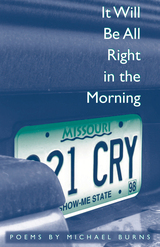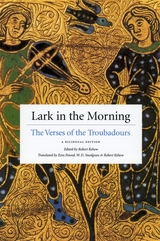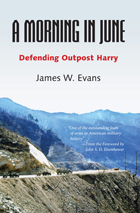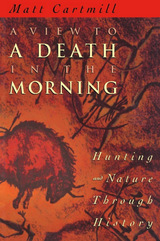
In his plain-spoken lyrics and dramatic monologues, Michael Burns digs at the marrow. His poems—in formal and free verse—are quick, incisive, and always capable of revealing the dark whimsies of fate and the pain of our own actions and inactions.
These poems travel to Casqui mounds in the Arkansas Delta, traffic-clogged urban streets, a wasteland in Oklahoma, and Faulkner’s Rowan Oak. They assume the voices of others so convincingly that we find ourselves face to face with hunters, philanderers, husbands, a Union general, a Snopes, and even a version of God.
Gathering the images of each place, crafting lines in clear, unpretentious language, Burns comes across new knowledge, confronting the ever-present mysteries and the ways the mind loves to lie to itself.

Lark in the Morning honors the meter, word play, punning, and sound effects in the troubadours' works while celebrating the often playful, bawdy, and biting nature of the material. Here, Robert Kehew augments his own verse translations with those of two seminal twentieth-century poets—Ezra Pound and W. D. Snodgrass—to provide a collection that captures both the poetic pyrotechnics of the original verse and the astonishing variety of troubadour voices. This bilingual edition contains an introduction to the three major periods of the troubadours—their beginning, rise, and decline—as well as headnotes that briefly put each poet in context. Lark in the Morning will become an essential collection for those interested in learning about and teaching the origins of Western vernacular poetry.


My Lord, What a Morning is a gentle and engrossing memoir, abounding with the tender and inspiring stories of Marian Anderson's life in her own modest words. From her humble but proud beginnings in south Philadelphia to international vocal renown, the legendary contralto writes of triumph and adversity, of being grounded in faith and surrounded by family, and of the music that shaped her career.
Anderson published My Lord, What a Morning in 1956 on the heels of her groundbreaking role as the first African American to perform at the Metropolitan Opera. In it are bittersweet reminiscences of a working-class childhood, from her first job scrubbing the neighbors' steps to the sorrow and upheaval of her father's untimely death. Here are the stories of a young girl with prodigious talent and her warm remembrances of the teachers, managers, friends, accompanists, and fans who worked to foster it. In addition, she provides a veritable travelogue of her concerts across the globe and rare glimpses at the personal life of a woman more concerned with family than celebrity.
With eleven photographs and a touching new foreword by Anderson's nephew, famed conductor and poet James DePreist, this edition of My Lord, What a Morning revives the classic portrait of a musical legend who was resilient in the bullying face of bigotry and gracious in the unfaltering glow of fame.

What brought the ape out of the trees, and so the man out of the ape, was a taste for blood. This is how the story went, when a few fossils found in Africa in the 1920s seemed to point to hunting as the first human activity among our simian forebears—the force behind our upright posture, skill with tools, domestic arrangements, and warlike ways. Why, on such slim evidence, did the theory take hold? In this engrossing book Matt Cartmill searches out the origins, and the strange allure, of the myth of Man the Hunter. An exhilarating foray into cultural history, A View to a Death in the Morning shows us how hunting has figured in the western imagination from the myth of Artemis to the tale of Bambi—and how its evolving image has reflected our own view of ourselves.
A leading biological anthropologist, Cartmill brings remarkable wit and wisdom to his story. Beginning with the killer-ape theory in its post–World War II version, he takes us back through literature and history to other versions of the hunting hypothesis. Earlier accounts of Man the Hunter, drafted in the Renaissance, reveal a growing uneasiness with humanity’s supposed dominion over nature. By delving further into the history of hunting, from its promotion as a maker of men and builder of character to its image as an aristocratic pastime, charged with ritual and eroticism, Cartmill shows us how the hunter has always stood between the human domain and the wild, his status changing with cultural conceptions of that boundary.
Cartmill’s inquiry leads us through classical antiquity and Christian tradition, medieval history, Renaissance thought, and the Romantic movement to the most recent controversies over wilderness management and animal rights. Modern ideas about human dominion find their expression in everything from scientific theories and philosophical assertions to Disney movies and sporting magazines. Cartmill’s survey of these sources offers fascinating insight into the significance of hunting as a mythic metaphor in recent times, particularly after the savagery of the world wars reawakened grievous doubts about man’s place in nature.
A masterpiece of humanistic science, A View to a Death in the Morning is also a thoughtful meditation on what it means to be human, to stand uncertainly between the wilderness of beast and prey and the peaceable kingdom. This richly illustrated book will captivate readers on every side of the dilemma, from the most avid hunters to their most vehement opponents to those who simply wonder about the import of hunting in human nature.
READERS
Browse our collection.
PUBLISHERS
See BiblioVault's publisher services.
STUDENT SERVICES
Files for college accessibility offices.
UChicago Accessibility Resources
home | accessibility | search | about | contact us
BiblioVault ® 2001 - 2024
The University of Chicago Press









